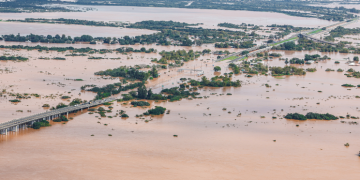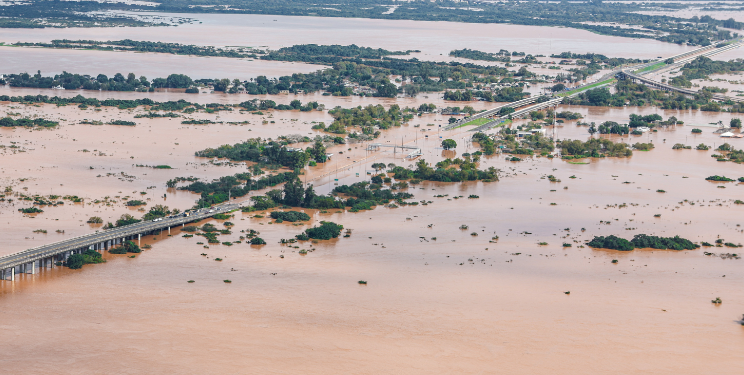Record rainfall in May 2024 in Rio Grande do Sul, Brazil’s southernmost state, caused devastating flooding, damaging the country’s agriculture and livestock industries. The flood destroyed food storage, halted harvests and damaged soils. In addition, destroyed or blocked infrastructure limits food transport and farm operations.
Governor Eduardo Leite called the rains one of the worst climate disasters in the state’s history. Local residents expected rain, but the scale and subsequent destruction “wasn’t… predicted,” Paulo Braque, a professor at the Institute of Biosciences at the University of Rio Grande do Sul and general coordinator of the Gaucho Institute of Environmental Sciences, told Food Tank.
Brazil is one of the top five producers of 34 agricultural commodities and is the world’s largest net exporter of agricultural products, according to the United States Department of Agriculture (USDA). Since 2000, Brazil has doubled the value of its agricultural products and tripled its livestock production. Brazil is expected to bring an additional 20 million hectares of arable land into production by 2031, one of the fastest growth rates in the world.
Rio Grande do Sul contributes significantly to Brazil’s agricultural production, producing 14% of Brazilian soybeans, 70% of rice and 73% of oats. The state is the largest producer of summer corn in Brazil and produces 11% of Brazilian pork and 20% of Brazilian poultry, according to the Brazilian Animal Protein Association.
“The flooded state of Rio Grande do Sul is one of the largest soybean producing regions in Brazil as well as a major rice growing area, and both crops are expected to be affected by the historic flooding,” Joana Colussi, postdoctoral researcher. Fellow and faculty member in the Department of Agricultural and Consumer Economics at the University of Illinois, tells Food Tank. “Part of the crop will rot and die; others will have lower yields than expected.”
The USDA reports that between 4% and 20% of the state’s soybean crop remains unharvested. The Instituto Rio Grandense do Arroz estimates that only 84% of the rice crop had been harvested by the time the rains began. Floods destroyed tens of thousands of hectares of what farmers were forced to leave behind. To ensure adequate supply and prevent price fluctuations, Brazil has temporarily suspended import duties on rice.
As the water level rose, many farm animals also died. Local pork producers are lobbying against ACSURS estimates that 12,600 hogs died in the floods, and local poultry farmers report losses of at least $5 million from livestock deaths alone.
Julia Catao Diaz, a sustainable consumption program specialist at the Consumer Advocacy Institute, told Food Tank that family farms will be especially felt by the large-scale disruption. Many of them, she said, lost not only crops, tools and equipment, but also their homes.
The effects of the flood may continue. Soaked soil will make it difficult to plant crops next season, and farmers may have to switch to other crops until the soil recovers, said Sylvia Massrois, president of the agricultural research agency Embrapa.
The flooding also severely damaged the state’s infrastructure, hampering the transportation of crops and the livestock sector. The rains destroyed roads, bridges and highways, and those that remained intact were heavily blocked. Rumo, a rail operator in Brazil, has suspended rail services to major ports, creating export bottlenecks and increasing dependence on trucks to transport food. Floods have clogged 100 roads and bridges on 58 roads, and alternative routes are forcing trucks to travel hundreds of extra miles, adding to the cost and time of transportation.
Transportation disruptions have particularly affected the pig and poultry sectors. Blocked roads prevented the transport of animal feed, water and employees, forcing 10 processing plants to suspend operations.
Diaz told Food Tank that food shortages, production disruptions
local agricultural sector, the effects may reverberate around the world. Future soybean contracts negotiated at the Chicago Board of Trade have already been impacted, reports the USDA.
In the aftermath of the floods, Brazilian President Luiz Inácio Lula da Silva is prioritizing helping victims while also highlighting the need for Brazil to better prepare for climate change and extreme weather events.
The catastrophic floods in Rio Grande do Sul have caused extensive damage to Brazil’s agricultural sector, affecting crop yields, livestock, and infrastructure. The long-term impacts may lead to higher food prices domestically and disruptions in global agricultural markets. As Brazil addresses immediate relief efforts, there is a pressing need for enhanced preparedness against future climate-related disasters.































